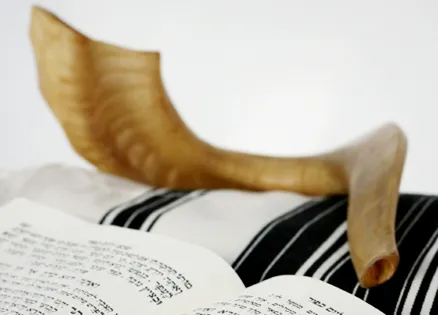Politics. What a dirty word. It seems few things inspire so many people to get so angry. I’m not immune to this. When I hear someone go on and on about a belief I highly disagree with, I feel that tension rise inside of me. It’s sickening.
Fortunately, at this time of year, while the airwaves are filled with shouting voices, right, left and everywhere in-between, there’s another sound that keeps me from getting caught up in the craziness.
What’s that sound? The loud blast of a hollowed out ram’s horn, the Shofar, calling Jewish people like myself to synagogue to repent for our sins and pray to be blessed with another fruitful, healthy and happy year of life.
According to the Old Testament, the ten days between Rosh Hashanah, the Jewish New Year, and Yom Kippur, the Day of Judgment (which begins sunset on September 25th and ends at sunset on September 26th this year), are a time when God debates our future. He gives us a chance to prove our righteousness, through repentance, good deeds and prayer–and a chance to reflect on how we act with others we may disagree with.
The Al-Het, or confessional prayer, that Jews recite on Yom Kippur contains a list of 44 sins. We all know the big ones to repent for, but some of the less obvious ones seem especially important to remember when engaging in debate during this election season.
1. The Sin of Hard-heartedness
When someone comes to us with a need, we cannot turn away from them. Even if they are asking for forgiveness.
My Rabbi explained it to me this way. “An apology is a step towards repentance. The individual may still have a lot of work ahead of them to regain your trust or make up for their wrong. But to reject their apology and hold a grudge is to say that for that individual there can be no repentance, and that is a sin.”
2. The Sins of Blurting Things from Our Lips, Harsh Speech, Vulgar Speech, Blabbing and Scoffing
Thirteen of the 44 sins confessed to in the Al-Het relate to the things we say. The Talmud says that when we speak, our mouths should act as "gates," controlling what comes out. Our words should be thoughtful, truthful and good-intentioned.
If we insult someone, make a joke at someone’s expense, or don’t take someone seriously just because he or she doesn’t agree with us, then we’re committing a sin. According to King Solomon, “The tongue has the power of life and death, and those who love it will eat its fruit.” (Proverbs 18:21)
3. The Sin of Passing Judgment
No, this doesn’t mean that all judges are sinners. Rather, the Rabbis interpret this to mean “always give people the benefit of the doubt” or “innocent until proven guilty.” To rush judgment is a sin. One must obtain all the information possible before deciding someone’s culpability.
4. The Sin of Stubbornness
This doesn't mean it’s a sin to hold fast to one’s opinion or beliefs. Rather, it means being unwilling to listen to an opposing view, or be able to concede that they may have a valid point. We must remain calm and rational, and not get upset if things aren’t going our way.
5. The Sin of Causeless Hatred
The word “causeless” implies that there are legitimate reasons to hate some people. But the Rabbis interpreted this to mean that people should be evaluated as individuals, and not hated simply because they belong to a certain group or subscribe to a certain belief. Race, religion or political beliefs are no reasons to hate anybody.
These are all good things for me, and others, to remember during a time when political debates can turn ugly. Maybe that’s why Election Day happens to fall so close to this spiritual day of judgment. To make sure our higher natures prevail.
Please, no politics in the comments below!
Download your FREE ebook, Mysterious Ways: 9 Inspiring Stories that Show Evidence of God's Love and God's Grace





